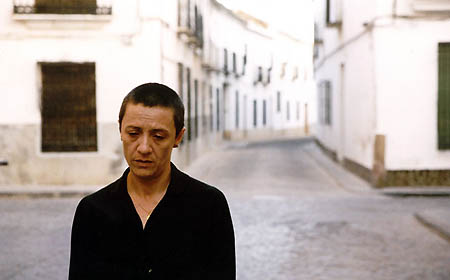Volver: for the love of Woman
Pedro Almodóvar is best known among international film fans as a director and writer who loves women, making films with prominent roles for mothers, lovers, and prostitutes. I would agree with this, to the degree that he loves looking at women’s bodies, the potential for fucking those bodies, and most importantly the roles they play in building men’s lives and sparking the fantasies of men’s inner worlds.
I’ll be honest: I’ve held a grudge since 2002’s Hable con ella, which first turned out to not be about the fascinating, fierce bullfighter (who is gored and silenced early in the first act), and then literally made two women into the voiceless objects that allow their creepy male paramours to bond with each other. The only woman who can truly listen and be loved is one in a coma, unable to interfere in a man’s fantasy of his relationship. Thanks, Pedro!
I am being unfair to that film’s characters and rich plot – after all, one of these men does save his beloved, by raping her comatose body and impregnating her with the stillborn infant whose birth will “wake her up.” What a hero!
Volver is less infuriating, but also less interesting in general. Almodóvar wrote and directed a film about close relationships between women and their lives in the oppressive shadow of death-focused superstitions in Almodóvar’s native La Mancha. The men in their lives are almost incidental – almost.
There are many, many female characters – two sisters, their mother and aunt, a teenage daughter, assorted friends (one of whom is, of course, a prostitute) – but not much characterisation spread thinly between them. They have scandalous secrets, and the slow revelation of these secrets is what passes for a plot – when all has been revealed to the audience, the film ends, leaving all other threads still undeveloped. For instance, the daughter demands to know who her biological father is, and her mother promises to tell her, but the film ends without that revelation. The audience has learned the shocking truth – she is the product of incestuous rape, both her mother’s daughter and half-sister – but she does not. Her arc is a flat line that peters out, like those of every other character.
There are a few keenly observed scenes, particularly in the emptiness and omnipresence of female socialising. Women meet, all kiss each other several times, polite words are shared but not engaged with, and they move on to the next visit, all busy-ness without purpose. At a funeral, the women squish together into a small room and the background conversation is like the buzz of a hive, oppressive and breathless. The buzz is silenced while one women tells a dramatic ghost story, and immediately starts up again at the story’s end. Moments of lives tick away in this, as wasted and ritualistic as the intense cleaning of graves that opens the film.
But none of these women are individual people. They are fractions of Woman, coming together seamlessly when needed, much like Voltron. This claustrophobic, demanding scene is their natural environment. When one demands they hand over their groceries, shelter a murderer, or help bury their husband’s body, they do so immediately. Conflicts are brief and aborted, immediately forgiven in the next scene with a hug and sloppy kisses, never to be mentioned again.
Males don’t fare very well in this film, either. Of the two men who have any driving force on the so-called plot, one is entirely off-screen, and both molested their biological or adopted daughters. The mere presence of pubescent pussy, even attached to someone whose diapers they changed, transforms them into heartless monsters of lust who deserve to die in a fire/leap on a kitchen knife.
Agustina, pictured above, is the best representation of the film. She is a woman who is alone, no family, no children, no job, who nonetheless takes care of an elderly neighbor, checking in on her daily and buying her food. She is tormented by the unknown fate of her mother, who disappeared the night her friends’ parents died together in a mysterious fire. Then, she’s diagnosed with a fast-moving cancer, and when her friends refuse to help her discover only whether her mother is dead or alive, goes on a talk show (in return for money that will allow her to seek life-saving medical attention) to air her story. But, she is too noble to air everyone’s dirty linen, and walks off the set. After all, on some level she knows what everyone else already seems to – her mother was having an affair with her friend’s horrible, daughter-raping father, whose wife set the fire that killed them both and allowed everyone to believe it was her who had died.
Her resolution? The cowardly murderer returns as a “ghost” to take care of Agustina as she dies, rather than confessing and giving the gentle and selfless Agustina some peace, or even providing her with money to receive treatment and potentially live. Er, yay?
This film is much like listening to some blowhard dinosaur expounding on the wonders of women and why he loves them so much: “They share my bed, raise my children, feed me and clean my house, support my community, absorb my abuse, philandering and abandonment, and die overworked and exhausted – such a wonderful mystery Woman is; I, as a mere Man, can never be expected to understand!”
